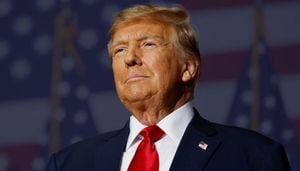Some prominent critics of Donald Trump, along with those he has targeted as "deep state" adversaries, are taking his threats of retaliation quite seriously. With the former president’s recent victory at the polls, the talk of revenge and settling old scores has intensified, prompting former administration officials and military veterans to begin preparations for possible fallout.
One notable figure, who previously served as a retired U.S. Army officer, originally sought Italian citizenship as he considered relocating should the political climate become hostile post-election. Sadly, he discovered he didn’t qualify for citizenship. Instead, he packed what he referred to as his "go bag," which contained cash and emergency contact numbers, ensuring he would be ready should he need to make a hasty exit.
Another individual who once held office under Trump’s administration has also declared intentions to apply for foreign citizenship. This individual has been increasingly anxious about the ramifications of their public denunciation of Trump and is weighing their options carefully, contemplating whether it’s wise to stay or to leave before the inauguration on January 20.
This sense of urgency isn’t isolated to military personnel or political figures. A former U.S. official who signed off on a controversial letter back in October of 2020—casting doubt on the legitimacy of emails purportedly from Hunter Biden's laptop—now finds themselves seeking a passport from Europe. This individual articulates the apprehension felt by many when they say, "You don’t want to have to scramble." That sentiment captures the anxious mood among various Trump critics—a clear desire to be prepared.
The specter of Trump’s comeback not only alarms these officials but has also galvanized political analysts and strategists. Discussions behind closed doors include what potential retribution could look like for those who have crossed him. Critics are warning of revenge politics, which many fear may include targeting specific individuals for their past actions and words against him.
Observers note how Trump’s history of hostility toward perceived enemies creates a chilling effect. His past administration was rife with examples of officials dismissed or publicly ridiculed for questioning his authority or for connecting with his political opponents. The allure of the presidency once again has sparked fears of retribution among those who oppose him or who are merely apprehensive about political maneuvering if he reigns again.
Political operatives are monitoring the situation closely, tracking which former staffers and critics are trying to prepare for potential fallout. It is believed by some insiders within Trump's circle of allies and supporters, including those planning to potentially fill administration positions, they might implement strategies to guide Trump's impulses and mitigate harmful actions toward former officials who may find themselves under scrutiny.
Even as Trump prepares to assume significant power again, critics remain inherently skeptical about his ambitions and whether he would pursue personal vengeance against political figures from the past administration or even individuals from the current administration.
Meanwhile, staffers and supporters of Trump are reportedly aware of the possibility of harsh retaliatory measures and are already moving to outline their rehab plans should grievances arise. This mix of cautious optimism and fear helps paint the picture of the political atmosphere surrounding Trump’s expected return.
At the heart of this discussion is the underlying question of transparency and accountability. Many believe Trump's potential plans could lead to abuses of power, where his past grudges may affect efforts to govern effectively. These fears transcend party lines, drawing attention to the possible undermining of democratic institutions which citizens already find increasingly fragile.
Within the broader narrative of Trump’s return, issues of national security have surfaced. Concerns about accountability and the fate of democratic processes are echoed by pundits who are watching with bated breath. The dynamics could potentially reshape political discourse, not only for the next four years but perhaps for decades to come.
This is also beginning to resonate within precincts of the Republican Party. A conversation has emerged whether the party should stand behind Trump during his potential second term or distance itself from him entirely. Some fear embellishing Trump’s footprint would send the wrong signal, especially among moderates who might be put off by such behavior.
The sense of unease isn’t unwarranted—many stories from Trump’s past reveal how he dealt with domestic confrontation, having often escalated situations rather than deflated them. This past promotes skepticism about whether he could channel any personal feelings without resorting to retaliatory tactics.
Looking toward the upcoming months, analysts highlight the importance of preparing adequately for Trump's presidency. Particularly, they suggest critics should brace for the worst, continuing to highlight civil liberties and political accountability as central to the discourse. Popular voices have begun to advocate for networks of fellowship among those opposing Trump, to create both safety and solidarity should the need for collective action arise.
Political analysts are already requesting more transparency from government officials and public servants, signaling the importance of holding those who wield power accountable. The consensus among opposition representatives is clear: history shows Trump’s capacity to mobilize and act swiftly against detractors, so vigilance is key.
Echoing these sentiments, lawmakers have voiced worries about the possibility of political purges, drawing comparisons to historical eras marked by oppressive regimes. The motto seems to be, prepare for the storm. Taking cues from beyond current borders has become imperative as those critiquing Trump take measures to safeguard against possible political retributions.
Communities across the United States are bracing for impactful changes following Trump’s win. The ramifications of those changes could have lasting effects beyond the political sphere and enter the day-to-day lives of citizens. Some groups have gone so far as to liaise with civil rights organizations, attempting to broker discussions about how best to protect vulnerable citizens from potential reprisals by government agencies.
Timely and structured approaches, like establishing roadmaps to navigate potential future situations or educating community leaders on safeguarding rights, form key action points for advocacy groups worried about impending changes under Trump’s administration.
With emphasis on engagement, proponents are encouraging community organizers to reach out to voters and build coalitions to offer support when it might be most needed. Statements supporting solidarity highlight the growing importance of community involvement, presenting them as pivotal agents standing against political repression.
While the political climate grows ever more turbulent, the essence of civic engagement remains at the forefront. History has taught citizens about the importance of being prepared and standing united against authoritarianism. The stakes are high, and as Trump continues to press his allies to consolidate power, the collective resolve of ordinary people might form the bedrock of resilience against potential upheaval.
At this juncture, Trump's playbook remains rooted deeply within his history of retribution. What remains uncertain is how far he is willing to go and whether the layers of preparation by those fearing his wrath will mitigate or amplify the situation. This is where the nation’s democratic instincts must wrestle with apprehensions as concern looms.



